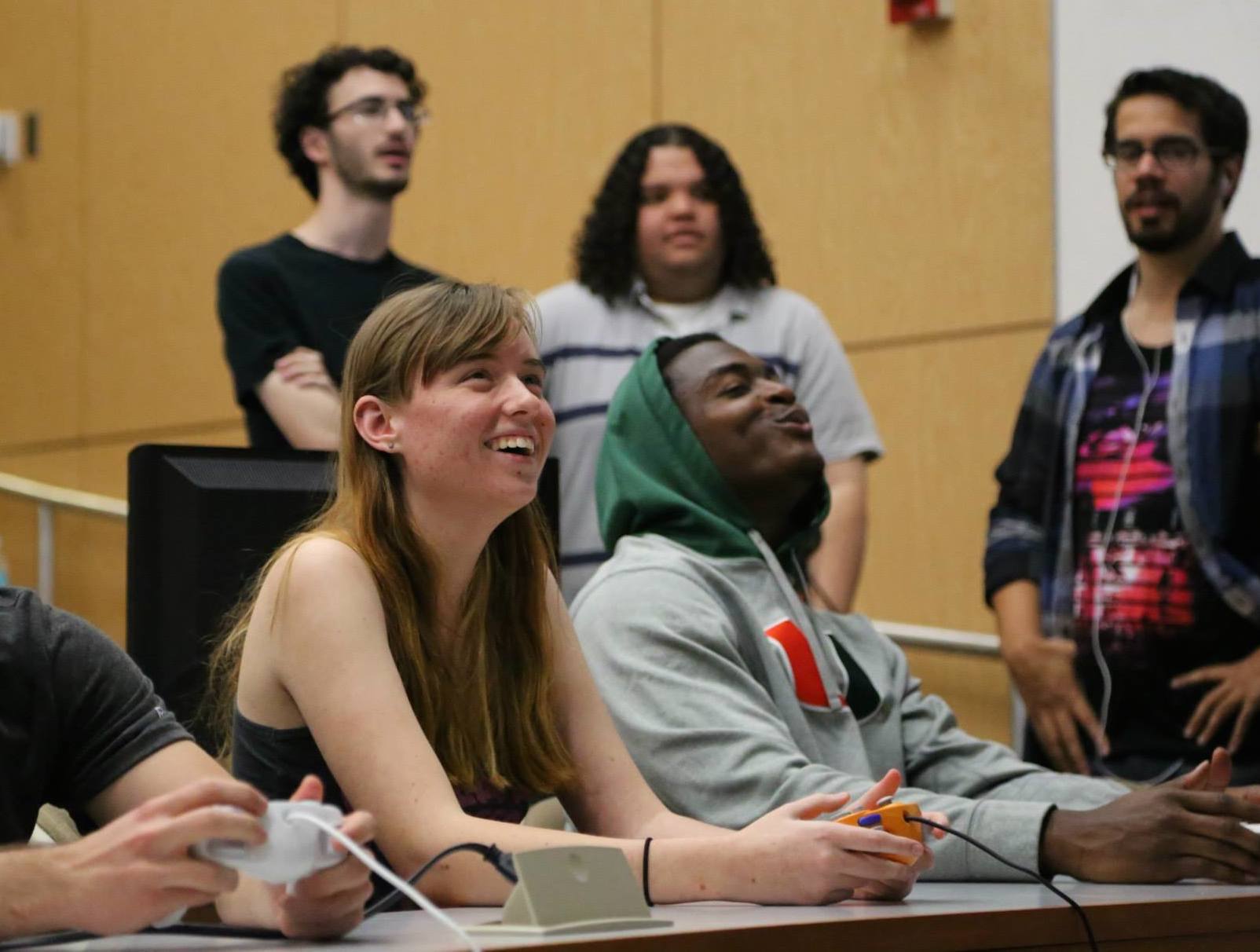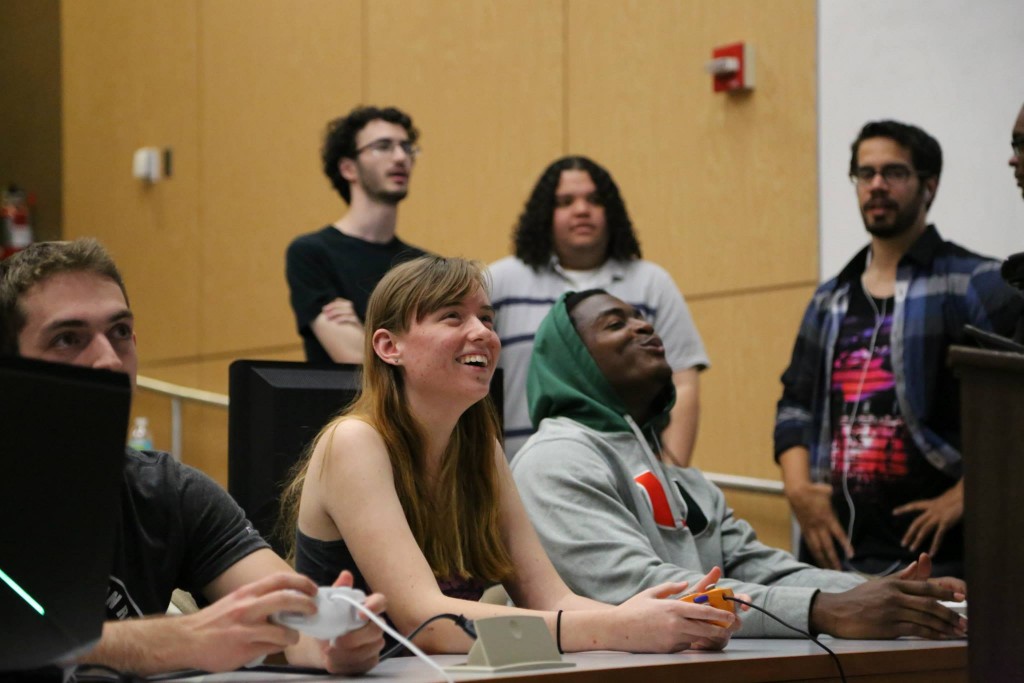

Angry comments flashed across the screen. “Oh, looks like we’ve got a girl here,” “Let’s kick her out.” In just a moment, junior Samatha Manus was booted off the server of the video game “Counter-Strike: Global Offensive” before firing a single shot. Before getting a chance to show her skills, Manus was not allowed to play online with a group of gamers simply because she is a girl.
“I didn’t even get to play; they didn’t even get to see my skills. They didn’t know if I’d be an asset to the team, and they booted me out of the server,” Manus said.
Manus and the other female members of the University of Miami’s Video Games Club (VGC) have watched this scenario play out time and again: angry and degrading comments directed at their skills, because they are female gamers in a mostly male realm.
“I don’t think ‘gamer girls’ want to be posers or want attention, man. I just want to play video games with people,” said junior Kathleen Wang, a VGC member.
Community
The club has about 60 active members, of which seven are female. VGC began two years ago, when junior Heather Zons was a freshman. Now, as the president, she is passionate about enhancing VGC’s presence on campus.
Zons saw VGC as a place to fit in. During her freshman year, she found she didn’t relate to girls on her floor because she played video games and none of the other girls did.
“When I discovered Video Games Club and how new they were, I really wanted to help them, because they helped me grow in terms of being more confident with how I am as a person in terms of a girl gamer,” she said.
Despite her experience with the organization, Zons was initially concerned about running for president.
“I was scared to try and run for president last semester because I didn’t think that people would take me seriously as a female president, but it’s working out so far,” she said.
Female VGC members feel completely comfortable with the gaming community and find their friends to be kind and accepting, Manus said.
“At UM it’s a wonderful experience,” she said. “The community that goes to Video Games Club are all nice people … everyone has good sportsmanship.”
Senior Nicholas Sanchez, VGC vice president, believes the club is very accepting and that members do not treat female gamers differently.
“I just want to iterate it’s a very small minority,” he said. “I believe that most guys would want more girls to play, like I would. I guess developers have always catered toward guys, so they feel it’s their own world, that it should only be theirs, but those guys are dumb.”
Wang agreed and noted that she has never been told anything offensive, except for a micro-aggression by a member who told her she plays “Super Smash Bros.” “really well, for a girl.”
“You just feel excluded,” Wang said of the negative comments. “You don’t really want to be excluded, especially from people you consider your friends … maybe he can say that girls that play games competitively in general are uncommon, but, I think people should be aware of what they’re saying more.”
However, for these players, online gaming is a different story. There, they fight a battle separate from the video game – one for respect in the field.
In online gaming culture, there is an unspoken rule to never show a picture of a gamer’s face and, instead, use avatars or game characters, according to Manus. When she first created an online profile, she used a photo of herself. Her boyfriend told her if she didn’t immediately take it down, she was going to receive threats, and men would post rude messages to her page as well as laugh at and mock her.
“Online is a scary place,” she said. “I don’t know why we can’t play together. Sure, there’s more guys in video games, I will absolutely give them that, but give us equal respect because anyone can be good and anyone can have fun with it.”
To avoid this treatment, it is also common for gamers to avoid mentioning gender at all. According to Manus, unless a player blatantly says she is a girl, other players assume they are playing with men, and she has often gone along with that to avoid getting treated negatively.
Throughout the years, Zons has chosen to embrace the fact that she’s a girl gamer, especially when practicing online for competitive competitions. When Zons plays online, she uses a photo of herself and uses her name as her screen name to make known that she is a female gamer. The rude comments she receives insult her skills, her looks and her abilities, but she has learned to not take it seriously.
“I use my gender to fuel more competitiveness rather than trying to stop it,” she said. “The fact that I went out of my way to be a competitive gamer, that’s kind of why I keep my name as ‘Heathermarie’ and keep my picture as myself. It’s more proof to you that you got beat by a girl. It’s so worth it.”
Sex Wars
This online behavior made national headlines with “Gamergate” in August 2014. It erupted into a full-scale culture war about sexism in video game culture, pitting those who wanted to hold on to the traditional, male-dominated gaming culture against those who asked for more inclusion and diversity in the gaming industry.
The catalyst for this furious debate, which took place through online forums and on Twitter with “#gamergate,” involved death and rape threats being made toward video game designers Zoe Quinn and Brianna Wu and feminist writer and media critic Anita Sarkeesian, The Washington Post reported. After their addresses and personal information were leaked online, they called the police and left their homes to escape the threats.
“I’m sure the Internet is bad because people can hide behind their computers and they have nothing better to do, but it just sucks, like there’s really no other way to put it. Just because you’re a girl, doesn’t mean anything,” Manus said.
The portrayal of female video game characters has also been criticized for unrealistic body proportions, sexual outfits, a lack of personality and the fact that females are rarely the main characters.
“Companies know what their demographic is,” Zons said. “It’s really saying a lot because if they are overly sexualized, it’s just cause that’s what the people want – not what the girls want, just what their demographic wants.”
Wang also realizes fictional characters are often designed to appeal to men and does not mind that, as long as gamers don’t expect people in reality to look and act the same way. When growing up, all her favorite characters were male because she did not have a female character to look up to.
“I would want to be a male because I would think that, I don’t know just the stuff they did, it was like man they’re so cool, they’re my heroes, but there are no female ones,” she said.
There has been a movement to add more female characters into popular games, such as “Call of Duty” and “Mass Effect.”
“There are some female protagonists that are on the rise, but it’s just what the people want; they don’t usually want to play as that,” Zons said. “They enjoy choosing themselves, like you can represent yourself in a game rather than forcing you to play as a person.”
In the future, Sanchez hopes that companies will implement changes into the industry.
“I don’t know what exact steps need to be taken,” he said. “Maybe more developers show the way. They’re making it like girls can do this too, but obviously you don’t want to separate or divide the community, you want to bring them all in together.”
Zons, however, is not optimistic about the gaming culture changing as the next generation consoles are shifting toward more online play, where the majority of the negative remarks take place. Instead, she believes there need to be more communities of players that come together to play, like VGC, rather than online chat rooms.
She is proud of the work VGC has been doing and is glad to foster a group of gamers who enjoy coming together to play, regardless of gender.
“Just bring your stuff and come play with us, there’s no restriction, just come play,” Zons said. “As much as we try to, I don’t say we try and get more female gamers, but we’re very accepting of them. But we understand how oppressed they are, because we are the ones who are oppressed.”
Featured image courtesy Mark Farrell via Flickr.





